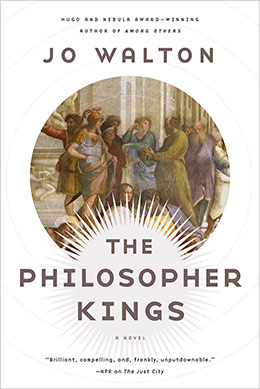Jo Walton’s The Just City came out only this January. A very odd, very engaging novel involving time-travelling philosophers from across millennia who are brought together by the goddess Athena to build a (doomed, time-limited) version of Plato’s “just city,” it forms in essence one long argument about consent, significance, volition and virtue—among other things.
The Philosopher Kings is The Just City‘s sequel, and oh, what an excellent continuation of the dialogue it is.
(Some spoilers ahead.)
It opens twenty years after The Just City’s explosive conclusion—the final debate at the close of which the goddess Athena transformed Socrates into a gnat, and disappeared, and the city itself broke apart in factions. One faction took ship and has not been heard of since the last debate; while in their wake the city divided yet further. There are now several cities where there once was one, and they have taken to raiding each other for the art collected from across the centuries by Athena, and brought to the original city.
The art raids are occasionally bloody, and the novel opens with a death. Simmea’s death, who was one of the three main point of view characters in The Just City. Apollo, her lover for twenty years in his mortal guise of Pytheas, is devastated by her death—utterly stricken by it—and vows revenge on her killers. But it is not clear who killed her. It may even have been Kebes’s people, those who left twenty years previously. And so Apollo gets himself aboard a mission to make contact with the world outside the island of the cities. With his daughter Arete, several of his sons, and a ship filled with volunteers—including Marsilio Ficino, now nearly a hundred years old, and Maia, both of whom had been among the original time-travelling philosophers—Apollo sets sail into the eastern Mediterranean.
And finds more there than he was expecting.
Like The Just City, The Philosopher Kings has three point of view characters. As with The Just City, each of them adds a different view, a different angle, on The Philosopher Kings’ events and its arguments. Those main arguments concern grief and love and what it means to strive for excellence—not just for oneself, but regarding other people in the world around. Apollo takes much of the limelight, as a god living for the first time with true mortal grief; and Maia returns to give us an older mortal perspective, one with the context of a human history beyond the prehistoric Aegean. Our new character, third of this triad, mirroring The Just City’s structure, is Arete, Apollo and Simmea’s daughter. Arete is in her mid-teens, the youngest of her parents’ children. Like the rest of her siblings, she knows that her father is a god in mortal flesh, and more than the rest of her siblings, she is put in the position of dealing with his overweening grief while still managing her own.
The Philosopher Kings is a complex novel to discuss, and I am not sure I can do so sensibly: it might well have been designed to appeal to the most childishly delightable* parts of me, the parts that fell in love with the baroque and bizarre nature of the Classical (and later) Greek world, and its peculiar excesses—philosophy not least among them. The parts that understand at least a little the Renaissance and post-Renaissance Enlightenment tendency to valorise Classical Greece and Republican Rome as golden ages for art and civilisation. The Philosopher Kings is in continual dialogue with Plato and Cicero, Marsilio Ficino and Pico della Mirandola, and even Thomas More and John Locke, Mary Wollstonecroft and John Stuart Mill, as much the tropes and tools of science fiction and fantasy—and I cannot help thinking that despite the presence of gods, including a final quasi-literal deus ex machina to resolve time-travel’s perpetual problem of paradox, this is much more work of science fiction than it is of fantasy.
But the science it deals with is moral science: it’s a science fiction of philosophy, as much argument as adventure, and its nature is such as to invite the reader to participate. That’s half the fun. More than half, over and above Walton’s agreeable prose and solidly believable characters—even Apollo is believable, and I have high standards for fictional gods, though that might be hubris. What does it mean to strive for excellence, as a person, and as a person among other people? What does it mean to be a hero, or a philosopher?
What’s just?
The Philosopher Kings is a very entertaining novel. It’s even more entertaining as an argument.
*If this is not a word, it needs to be one henceforth.
The Philosopher Kings is available June 30th from Tor Books.
Read an excerpt from the novel here on Tor.com
Liz Bourke is a cranky person who reads books. Her blog. Her Twitter.










